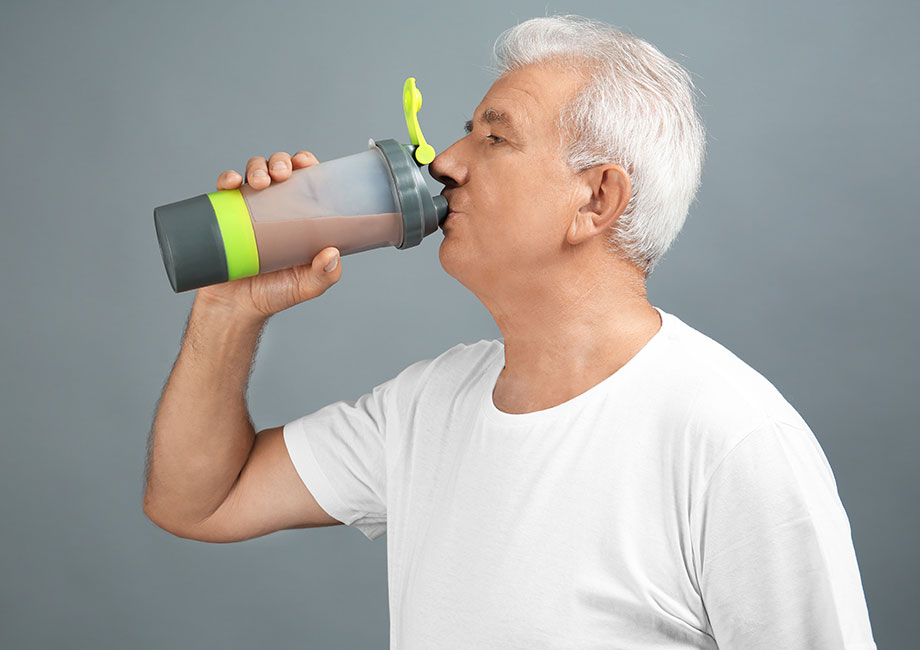We test and review fitness products based on an independent, multi-point methodology. If you use our links to purchase something, we may earn a commission. Read our disclosures.
The current Recommended Dietary Allowance (RDA) for protein is 0.8 grams per kilogram of body weight. However, research continues to show1 that you need quite a bit more than that. Those measly 0.8 g/kg just aren’t cutting it for most, especially older adults, and you actually need at least 1.2 g/kg.
Our senior population is growing faster than ever before as older adults maintain their independence, health, and quality of life. Many factors influence health across the lifespan, but you can’t overlook the impact dietary intake has on wellness. Enter protein. Is it the MVP of senior health? It’s tough to say, but it’s high on the list of contenders. Protein intake and its effects on muscle mass play a critical role in the overall health of the senior population. Still, age can make it challenging to meet your protein needs on whole foods alone. That’s where protein drinks for seniors come into play.
As a registered dietitian nutritionist, I know the importance of maintaining a healthy diet regardless of age. That said, here’s my expert breakdown of the types of protein available, the daily amount seniors should aim for, and the benefits of added protein for seniors.
Medical disclaimer: This article is intended for educational and informational purposes only. It is not intended as a substitute for medical advice. For health advice, contact a licensed healthcare provider.
What Is a Protein Drink?
A protein drink is a dietary supplement that bridges the gap between nutritional intake and nutritional needs. Many protein shakes contain small amounts of carbohydrates and fat but aren’t meant to be long-term meal replacements. Instead, most prioritize protein content to help you meet your daily protein needs. They’re popular among fitness enthusiasts, but healthcare experts continue to highlight their health benefits to the general public as well.
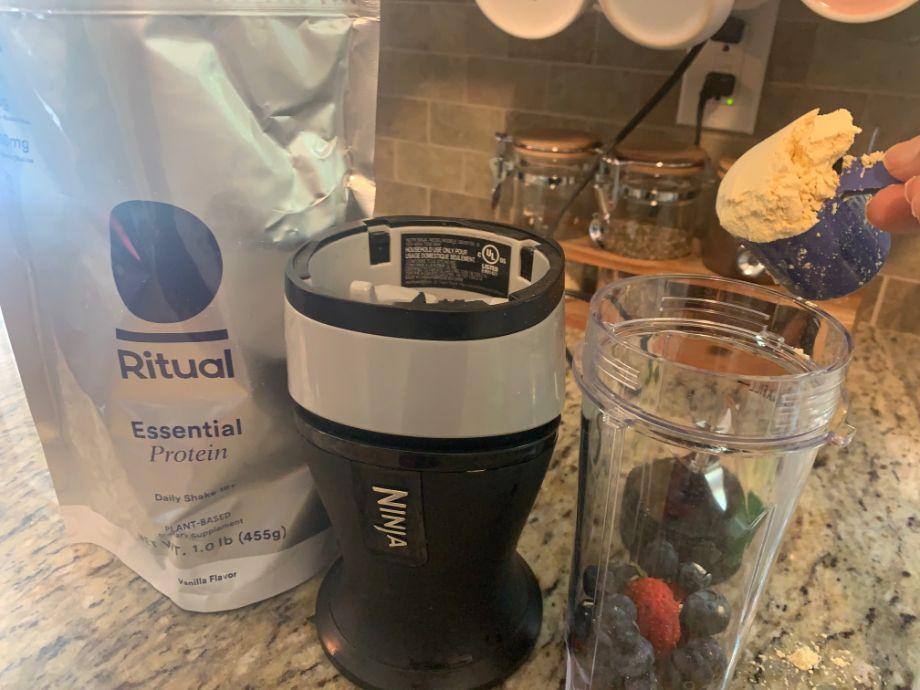
Protein drinks come in various forms, including ready-to-drink products and protein powders that you mix with a liquid before consuming. You can also create your own protein shakes without protein powder if you prefer. Either way, protein-rich drinks are a convenient and efficient way to boost protein intake, especially for those with increased needs or experiencing difficulty meeting their needs through foods alone.
Types of Protein
Protein drinks are available in various forms, catering to different taste preferences, dietary restrictions or sensitivities, and health goals. With so many options, it can get overwhelming, so start by choosing the protein source that best fits your needs.
- Whey protein: Whey protein, derived from milk during the cheese-making process, is one of the most popular types of protein used in nutritional supplements. It boasts an impressive amino acid profile, making it an excellent choice for building or maintaining muscle. The best whey protein is available in three forms: whey concentrate, isolate, and hydrolyzed whey.
- Casein protein: Casein protein powder is also derived from milk but typically digests more slowly than whey protein. It’s known for its slow release of amino acids, which is why many people consume it before bed to support muscle repair overnight.
- Plant-based protein: Plant-based protein drinks are made from various plant sources, such as peas, soy, hemp, rice, or a blend of two or more. What’s the key difference between plant-based protein and whey? Plant-based nutritional supplements may be ideal for those with lactose intolerance or those following a vegan or vegetarian lifestyle.
Of course, the macronutrient ratio can vary greatly among these different types of protein drinks. Depending on their ingredients, some drinks may be low-fat and have a low sugar content, while others are high-calorie shakes with added sugars. Which brings me to the next section.
Key Ingredients To Look For
My suggestion is to look for options with minimal ingredients. Fewer ingredients can translate to better tolerance and a lower cost per serving. However, your ideal formulation will also depend on your health goals and dietary needs.
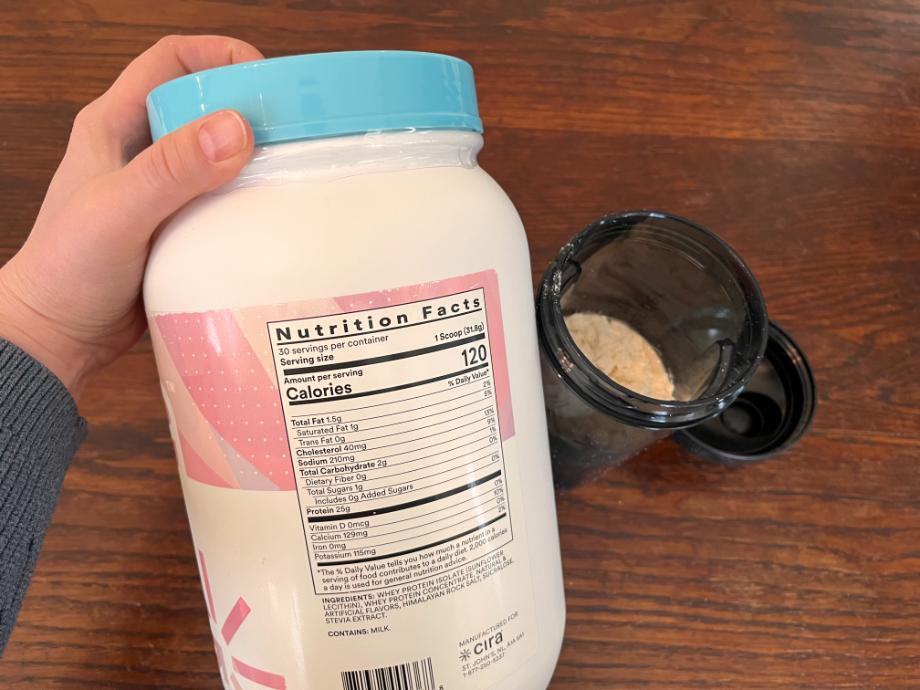
- Protein source: Protein powders and drinks have a reputation for being difficult to digest, and since your digestion abilities change as you age, it’s essential to choose a protein source that your GI tract can tolerate. Hydrolyzed whey protein is often praised for its digestive ease, but still discuss your options with your doctor or registered dietitian.
- Sweeteners: Added sugars may spike blood sugar levels, but artificial sweeteners may cause gastrointestinal upset in some people. Choose a protein shake with a sweetener that supports your health needs without causing negative side effects.
- Added ingredients: Many protein drinks incorporate added ingredients, such as thickeners and artificial flavorings. When possible, look for minimal added ingredients to reduce the risk of adverse effects. Plus, protein drinks with fewer ingredients give older adults more autonomy over their nutritional intake. For example, a chocolate protein drink with few ingredients gives you room to add other nutrient-dense ingredients like peanut butter.
RELATED: What To Look For in Protein Powder
How Much Protein Do Seniors Need?
As I mentioned before, the current RDA for protein is 0.8 grams per kilogram of body weight daily. While that recommendation may work for a select few, research tells us most senior adults (actually, most adults in general) need much more than that. Experts actually recommend1 that elderly adults aim for between 1.2 and 2 grams of protein per kilogram of body weight to support healthy aging. Unfortunately, most adults—38% of men and 41% of women1—consume far below that amount.
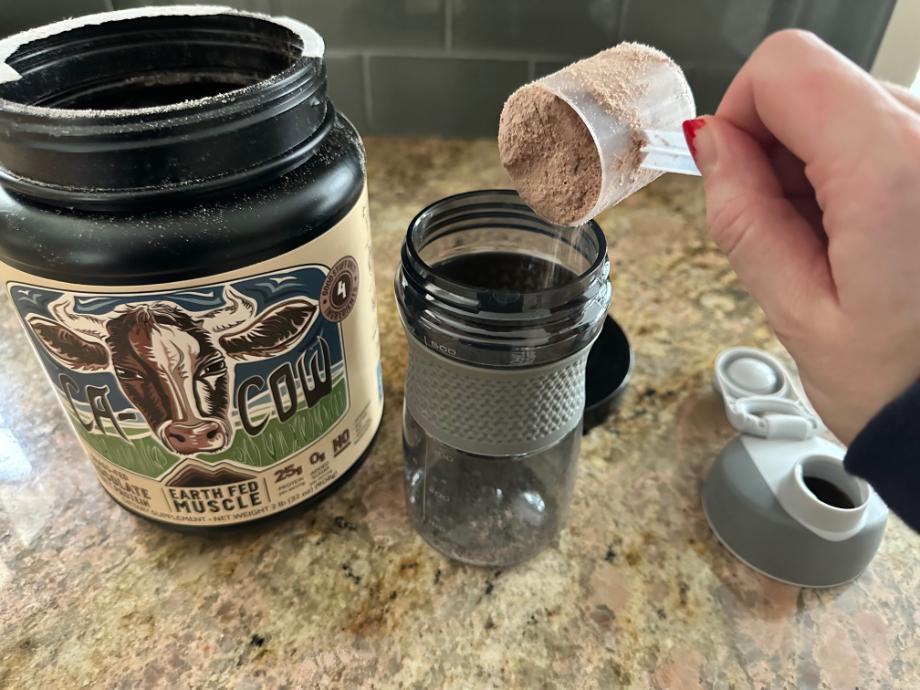
RELATED: How Much Protein Do I Need?
Of course, several factors affect your ideal amount of protein, including activity level, medical history, and biometrics. A registered dietitian nutritionist can help you navigate the many elements involved in calculating your dietary needs.
Benefits of Protein Drinks For Seniors
Protein shakes aren’t just for bodybuilders—the benefits of protein are for everyone! Whether they’re ready to drink or require a little mixing, nutrition shakes rich in protein content offer many health benefits for older adults:
Helps Maintain Muscle Mass
Loss of muscle mass, or sarcopenia, is linked to reduced functional capacity2 and lower quality of life in adults, especially older adults. As its prevalence continues to grow worldwide, many people are exploring ways to maintain their lean muscle mass. Building muscle can require a holistic approach, but this is where dietary protein intake really shines.
Amino acids are often called the body’s building blocks. They link together to form the primary structure of proteins, which the body then uses to repair and build muscle tissue after exercise or injury. As we age, many people find it challenging to meet their protein needs through whole foods alone. For example, meat may become difficult to chew. Protein supplements are an excellent way to bridge the gap in the average senior’s diet, and the evidence is there. Science has shown us3 that protein supplementation can improve muscle mass and function in elderly people.
Helps Support Bone Health
Protein’s benefits extend to bone health, too, as increasing your protein intake can increase your bone mineral density. Osteoporosis occurs when the body can’t create new bone fast enough to keep up with the loss of old bone. It continues to affect a large number of aging adults, but several lifestyle factors can counteract bone loss.
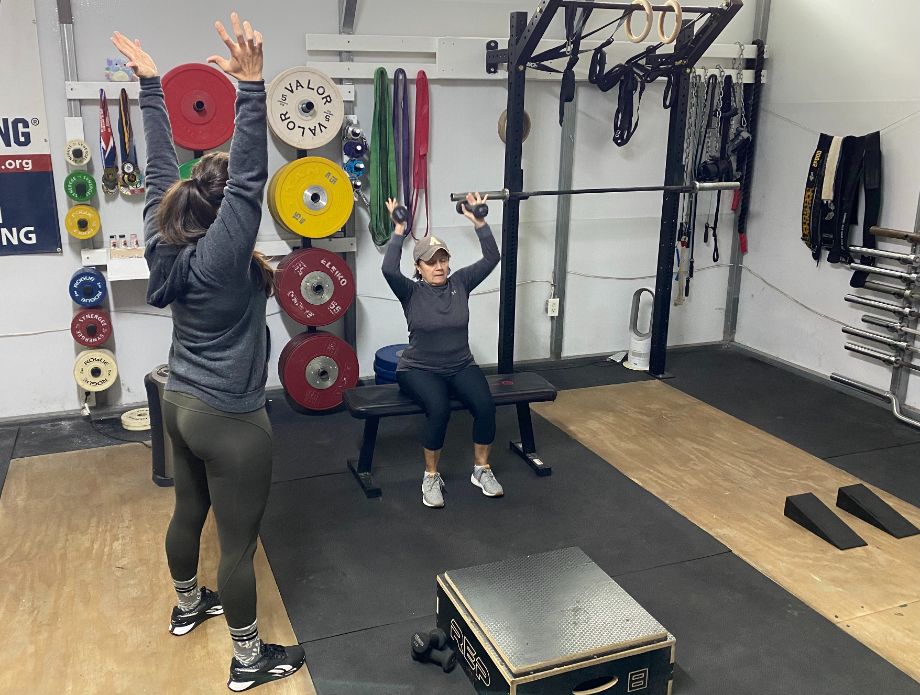
Research has linked4 high protein intake to higher bone mineral density in the hip, whole body, and lumbar spine and a lower risk of vertebral fracture. A diet rich in protein increases the insulin-like growth factor hormone5, which increases the intestinal absorption of calcium, improves muscle mass, and suppresses the parathyroid hormone. Drinking high-quality protein shakes can help older populations maintain their skeletal health.
RELATED: Best Protein Shakes
Aids in Immune System Support
Missing out on essential nutrients, like protein, can directly impact your immune system. Since amino acids are required for synthesizing immune proteins like cytokines and antibodies, consuming enough protein is key to your overall health. Plus, increasing your protein intake with nutritional supplements may help bolster your immune function in more ways than one.
Many protein nutrition drinks provide a significant amount of your protein needs as well as various vitamins and minerals. Some drinks are rich in vitamin D, potassium, calcium, magnesium, and other nutrients needed to power your body’s systems. These key nutrients make high-protein drinks an excellent way to help boost your immunity.
Protein Drinks For Seniors: Final Thoughts
As research points to higher protein needs in older adults, many are searching for convenient ways to boost their intake. Cue protein drinks! Protein shakes are an efficient way to bridge gaps in your diet, helping you meet your needs and support overall health. They offer many health benefits for muscle mass, bone strength, and immune function.
Not sure which protein drink is best for you? The expert testers at GGR have tried well over 100 protein powders, and narrowed down the best protein powders for seniors to get you started. And, of course, a registered dietitian can help you choose the right protein supplement for you or your loved one!
To recap:
- Most older adults need at least 1.2 grams of protein per kilogram of body weight daily.
- Protein plays a key role in maintaining muscle mass, supporting a healthy immune system, and good bone mineral density.
- Protein drinks are available ready to drink or as protein powders that you mix with a liquid.
- Protein supplements shouldn’t serve as meal replacements.
Protein Drinks For Seniors: FAQs
Which protein drink is best for seniors?
The best protein drink for older adults will depend on your health goals, current dietary intake, and medical history. Ideally, your protein drink should contain more protein than carbs or fat and fewer artificial ingredients.
What is the best protein for the elderly?
The best protein for older adults depends on one’s dietary restrictions and nutrition needs. Hydrolyzed whey protein contains all the essential amino acids and is typically easy to digest, but other types of whey and casein protein are appropriate for most adults. Plant-based proteins like pea, soy, and rice proteins are ideal for those on a vegan or vegetarian diet.
RELATED: Whey Protein Isolate vs Hydrolyzed
What are the symptoms of protein deficiency in the elderly?
Symptoms of protein deficiency can include edema, fatigue, slow-healing injuries, mood changes, and changes in your hair, skin, and nails.
These statements have not been evaluated by the Food and Drug Administration. This product is not intended to diagnose, treat, cure, or prevent any diseases.
References
- Baum JI, Kim IY, Wolfe RR. Protein Consumption and the Elderly: What Is the Optimal Level of Intake?. Nutrients. 2016;8(6):359. Published 2016 Jun 8. doi:10.3390/nu8060359
- Petermann-Rocha F, Balntzi V, Gray SR, et al. Global prevalence of sarcopenia and severe sarcopenia: a systematic review and meta-analysis. J Cachexia Sarcopenia Muscle. 2022;13(1):86-99. doi:10.1002/jcsm.12783
- Kwon HE, Ko N, Yuk D, Choi SW, Koh SE. Improved Muscle Mass and Function With Protein Supplementation in Older Adults With Sarcopenia: A Meta-Analysis. Ann Rehabil Med. 2023;47(5):358-366. doi:10.5535/arm.23076
- Weaver AA, Tooze JA, Cauley JA, et al. Effect of Dietary Protein Intake on Bone Mineral Density and Fracture Incidence in Older Adults in the Health, Aging, and Body Composition Study. J Gerontol A Biol Sci Med Sci. 2021;76(12):2213-2222. doi:10.1093/gerona/glab068
- Mangano KM, Sahni S, Kerstetter JE. Dietary protein is beneficial to bone health under conditions of adequate calcium intake: an update on clinical research. Curr Opin Clin Nutr Metab Care. 2014;17(1):69-74. doi:10.1097/MCO.0000000000000013
Further reading

Looking for a high-value air bike? Our Fringe Sport Raptor Air Bike review looks at one of the latest machines to hit the market. Read more

The current Recommended Dietary Allowance (RDA) for protein is 0.8 grams per kilogram of body weight. However, research continues to show1 that you need quite a bit more than that. Those measly 0.8 g/kg just aren’t cutting it for most, especially older adults, and you actually need at least 1.2 g/kg.Our senior population is growing faster than ever before as older adults maintain their independence, health, and quality of life. » Read more about: Protein Drinks for Seniors: Meeting Increased Protein Needs » Read more

Check out our Stamina rowing machine reviews to see which affordable rower we like best! Read more

Looking for a resistance band workout? We’ve got you covered with this 20-minute routine. Read more

